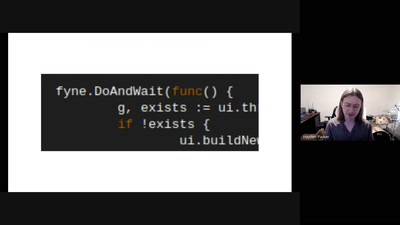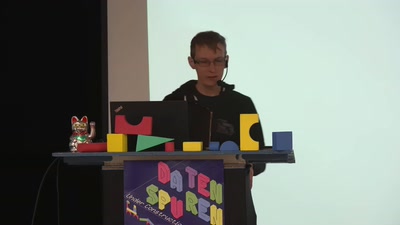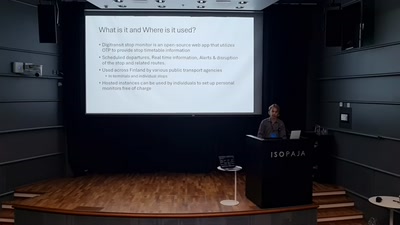Feed cleverhans-blog [copy] http://www.cleverhans.io/feed.xml has loading error: cURL error 22: The requested URL returned error: 404
Lightning talks & Community Showcase (fyneconf2025)

Talks and apps from around the Fyne community
Nova : Why I chose Fyne
Hayden P : “Bounce” chat app
Simon D : Integrating video into a Fyne app
App showcase - Supersonic, Slydes and Apptrix.ai
about this event: https://c3voc.de
Video:import-56437-eng-Lightning_talks_Community_Showcase_hd.mp4
KopfKino - das musikalische Filmquiz (DS2025)

Filmfans aufgepasst! Unser Kopfkino stellt euer Wissen rund um Filme und Serien auf die Probe.
Filmfans aufgepasst! Unser Kopfkino stellt euer Wissen rund um Filme und Serien auf die Probe. Erkennt ihr alle Filmmelodien? Könnt ihr alle Zitate zuordnen? Habt ihr das nötige Serien-Wissen, dass es braucht, um euch auf den ersten Platz zu rätseln?
KopfKino ist eine Mischung aus Kneipenquiz und Konzert. Es gibt klassische Quizfragen rund um das Thema Film und Fernsehen sowie live gesungene Filmmusik.
Licensed to the public under https://creativecommons.org/licenses/by/4.0/de/
about this event: https://talks.datenspuren.de/ds25/talk/XQRDZC/
Video:ds25-503-deu-KopfKino_-_das_musikalische_Filmquiz_hd.mp4
Das Colourful ddCentralwerk balConian Datenspuren Display (DS2025)

Aufgabe: Coole Anzeige bauen!
* aufbauen
* checken
* aufbauen
* best practices
Wie eine LED Anzeige gebaut werden kann, was man beim Bau einer Anzeige alles lernt und wie man endlich alles ansteuert.
Die Anzeige kann während der Veranstaltung bespielt werden.
Licensed to the public under https://creativecommons.org/licenses/by/4.0/de/
about this event: https://talks.datenspuren.de/ds25/talk/DC3ECJ/
Video:ds25-596-deu-Das_Colourful_ddCentralwerk_balConian_Datenspuren_Display_hd.mp4
When Technology Policy Defends Human Dignity
In late August, Italy took a decisive step to protect women from one of the most insidious forms of online abuse: the non‑consensual sharing of intimate or misappropriated images. After years of complaints, activism, and public outrage, a notorious website — home to thousands of stolen photos of women, from ordinary citizens to public figures — was forced offline following a wave of legal and political pressure.
The post When Technology Policy Defends Human Dignity appeared first on Purism.
The NYPD’s $3B “Domain Awareness System” isn’t just a New York problem—it’s a warning for every American
In her September 15, 2025, New York Times opinion piece, Elizabeth Daniel Vasquez lays bare a reality too many Americans have ignored: the New York Police Department has quietly built one of the most expansive, integrated surveillance systems in the nation’s history.
The post The NYPD’s $3B “Domain Awareness System” isn’t just a New York problem—it’s a warning for every American appeared first on Purism.
Living in the Regulatory Future: Purism, the EU Data Act, and America’s Patchwork Privacy Laws
Recently, the EU Data Act was officially enacted — and with it, a new era of enforceable digital rights. Where the GDPR set the policy framework, the Data Act demands proof: verifiable, auditable systems that deliver true data portability, secure interoperability, and privacy‑by‑design across sectors.
The post Living in the Regulatory Future: Purism, the EU Data Act, and America’s Patchwork Privacy Laws appeared first on Purism.
Inbox, Meet AI: How I Built My Personal Email Agent with LangGraph

Imagine having an assistant who never sleeps, never forgets, and always keeps an open line of communication with you. No fancy apps, no constant prompting—just a simple inbox. That’s the beauty of an email-based AI agent. By giving my AI its own email address and letting it regularly check for messages, I suddenly had a flexible, asynchronous way to collaborate with it.
Whenever I need something—summarize a long document, draft a reply, add a task to my list—I don’t have to open a special dashboard or remember a new command syntax. I just send an email. Hours later, I can check...
GNUnet 0.25.0
GNUnet 0.25.0 released
We are pleased to announce the release of GNUnet 0.25.0.
GNUnet is an alternative network stack for building secure, decentralized and
privacy-preserving distributed applications.
Our goal is to replace the old insecure Internet protocol stack.
Starting from an application for secure publication of files, it has grown to
include all kinds of basic protocol components and applications towards the
creation of a GNU internet.
This is a new major release. Major...
libgnunetchat 0.6.0
libgnunetchat 0.6.0 released
We are pleased to announce the release of libgnunetchat 0.6.0.
This is a minor new release bringing compatibility with the major changes in latest GNUnet release 0.25.0. A few API updates and fixes are included. Additionally the messaging client applications using libgnunetchat got updated to stay compatible. This release will also require the GNUnet services from version 0.25.0 or later because of that.
Show & Tell: Finland's stop monitor (otp2025)

Heikki shows the stop monitor of the Digitransit project.
about this event: https://c3voc.de
Video:import-56440-eng-Show_Tell_Finlands_stop_monitor_hd.mp4